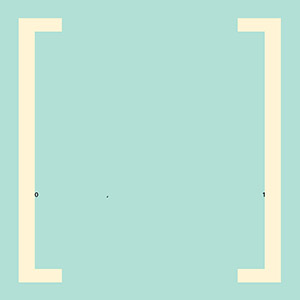 The latest release from Tietchens continues the ambiguity that has been prevalent through his recent works. Far from the early experiments with sampling and erratic, mechanical rhythms that characterized much of his early work; Ornamente (zwischen Null und Eins) is an opaque disc of hushed electronics and tiny bits of glistening noise. Moments of near silence are followed by digital glitches and massive, intense vibrations to result in another piece of conceptually challenging, yet extremely satisfying piece of complex sound art from one of the masters.
The latest release from Tietchens continues the ambiguity that has been prevalent through his recent works. Far from the early experiments with sampling and erratic, mechanical rhythms that characterized much of his early work; Ornamente (zwischen Null und Eins) is an opaque disc of hushed electronics and tiny bits of glistening noise. Moments of near silence are followed by digital glitches and massive, intense vibrations to result in another piece of conceptually challenging, yet extremely satisfying piece of complex sound art from one of the masters.
Recent works from Tiechens have embraced obscurity, and this one is no different:A stylized mathematical notation in place of cover artwork, and the only text being a German passage from Romanian philosopher Emil Cioran (someone Tietchens alludes to in past works) does not elucidate much.There are no other elements to grab hold of as far as underlying conceptualism or deeper themes being presented on Ornamente, requiring that the sound itself stand fully on its own.
Which, being Tietchens, is of course what happens.The opening piece, "Ornamente 1," is built from passages of electronics, first as a slightly FM tinged synth-like swell that he expands upon and tears apart.Additional layers of bent electronics are blended as they are slowly stretched out by Tietchens into more pained, nasal passages of noise.What finally remains at its conclusion is what best resembles long forgotten computer data recordings, drifting into the emptiness of space.
Comparably, "Ornamente 2" is a much more restrained work.Never silent, but the electronics are kept lower in the mix, with tiny bits of more forceful sound bubbling to the surface.At times the sounds resemble clinking glasses, or dripping water, or perhaps even a treated xylophone, though in all likelihood they are none of these things.This transitions right into "Ornamente 3", which retains many of the same facets but goes into a more ghostly place.A sense of emptiness and hollowness pervades through the drip-like bits and haunting electronics.While not overly bleak, the ambiguous nature of the piece is a definite asset.
The fourth segment remains near silence, with almost a glitch-like click resonating through the wide open sonic space, at times the whole piece sounding like the artifacts from a poorly compressed mp3 file that are isolated from their source.The final piece, "Ornamente 5" is the stand-out piece, and the appropriate dramatic conclusion for the record.Beginning with a bassier, more heavy sound, Tietchens builds from massive vibrations that are far more forceful than anything else on the album.This shift to more forceful dynamics is why it acts as such astrong conclusion to the album.
While I may be at a loss to understand the conceptual undercurrent to Ornamente, that has never been a prerequisite to enjoying Asmus Tietchens' work.It may be thematically impenetrable, but the reward has always been in the sound.Like most of his ever-expanding catalog, the actual sound that comprises this album shines through fully detached from any and all sort of specific concept that may or may not have been intended.
samples:
 
Read More

